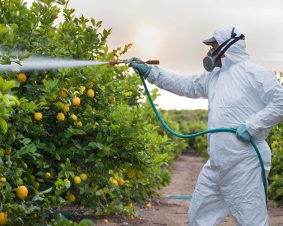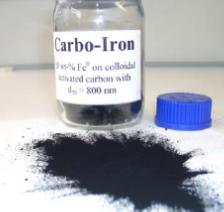 >
Spotlight March 2022: Safe Materials from Scratch – Safe-by-Design-Concept in action
>
Spotlight March 2022: Safe Materials from Scratch – Safe-by-Design-Concept in action
In recent decades, German research on nanomaterials and new, innovative materials has been widely expanded by material safety aspects. European initiatives also pay significant attention to this: both the European Union (EU) Green Deal, and the Chemicals Strategy for Sustainability (CSS) aim to create a sustainable, climate-neutral economy with sustainable and safe chemicals and products, while better protecting human health and the environment. The focus is on fostering innovation while addressing global challenges.
The Safe-by-Design (SbD) strategy for nanomaterials and innovative materials is one approach to address precisely these challenges (see also Spotlight Research of November 2021). Risks to humans and the environment should ideally be identified, assessed, and reduced on an early stage of the development process. The European Horizon 2020 project NanoRegII also deals with safe-by-design and is the first project that has now conducted a practical test of the safe-by-design concept. The NanoRegII safe-by-design strategy was implemented at six companies. The experience gained was then evaluated and guidelines for practical implementation of the safe-by-design strategy for the future were developed. In addition to being informative, the guidelines also contain several tools that are intended to help identify risks at an early stage. This should enable an assessment at each step in the innovation process as to whether the innovation should be continued and, if so, which safe-by-design measures need to be further applied to reduce uncertainties. The guidelines thus offer a first approach that can be adapted by each company to its specific requirements for innovation.
Original Publication:
Sánchez Jiménez, A. et al 2022 Safe(r) by design guidelines for the nanotechnology industry. NanoImpact 25, 100385.

Weitere Spotlights
Spotlight May 2022: Nano-ghosts” – Risk assessment of submicron-sized particles in food biased towards fictional “nano”
The European Commission has issued a ban on the colorant titanium dioxide in food. Titanium dioxide, which provides a nice shine and bright white color, can potentially damage genetic material. We chose a review article from 2022 for the May 2022 Spotlight that addresses the risk assessment of food-grade titanium dioxide (E171) and the resulting […]
Read moreSpotlight October 2021: Nanopesticides – a proposal for a risk assessment framework
The application of so-called “nanopesticides” (see also cross-sectional text Nanomaterials in plant protection products) is said to have two basic advantages: a smaller amount of pesticide is needed for the same agricultural area and the efficacy is improved. This is necessary to grow enough food for a still growing world population. However, this could also […]
Read moreSpotlight December 2022: Fighting tumors with micro robots
When we, the DaNa team as operators of the website nanopartikel.info, write about nanobots, i.e. nanometre-sized machines, we point out that these machines belong to science fiction, may even remain a utopia – i.e. never realisable. On the significantly larger micro-scale, however, small machines are conceivable that could help in the therapy of diseases, e.g. […]
Read moreSpotlight September 2020: Groundwater remediation with Carbo-Iron® – Risk or Benefit?
In September we would like to present a paper of the BMBF project Fe-Nanosit. The project dealt with the use of iron-containing nanomaterials in groundwater and wastewater remediation. A comprehensive assessment and weighing of benefits and possible environmental risks resulting from the application is now presented by the project partners in this paper. Groundwater is indispensable for the […]
Read more


